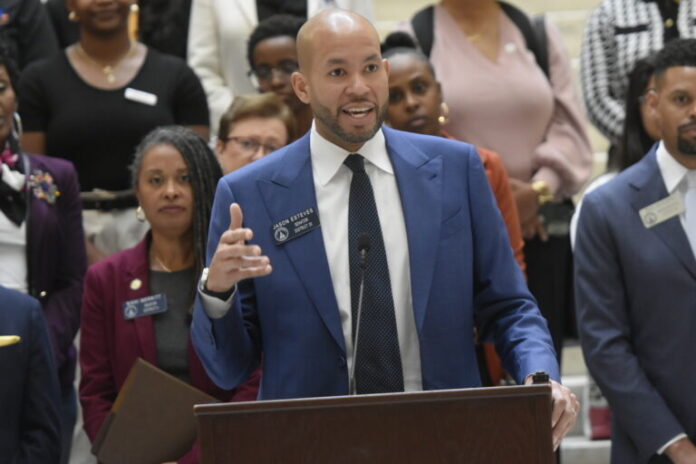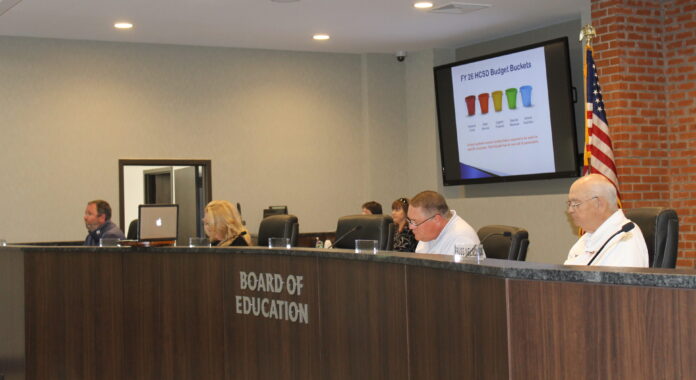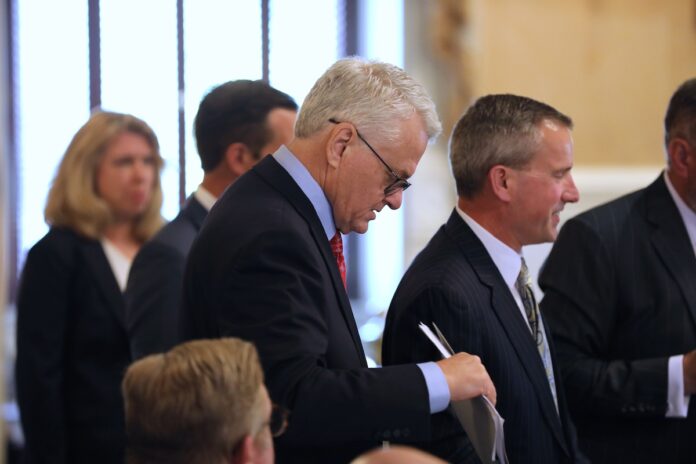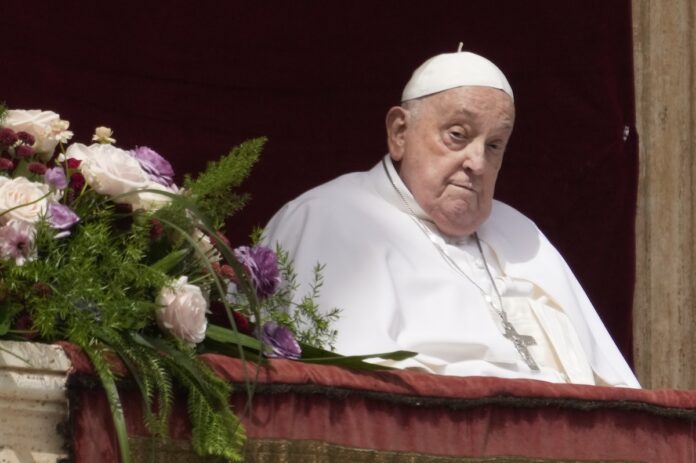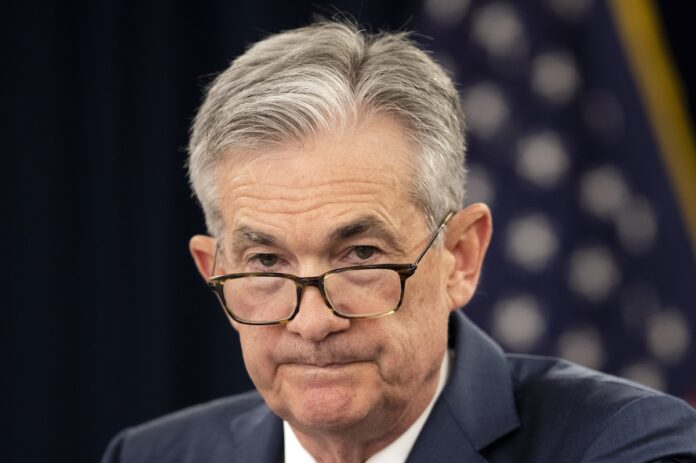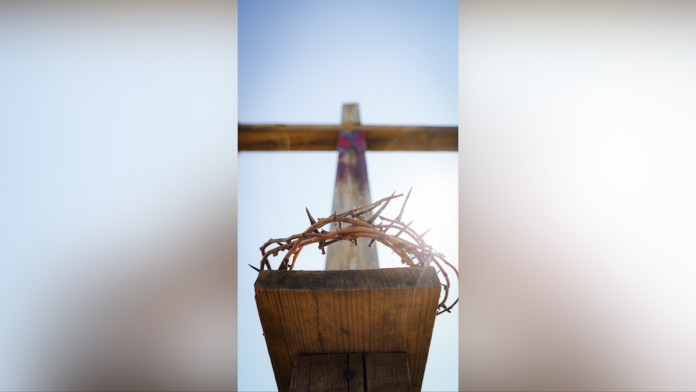VATICAN CITY (AP) — Pope Francis, history’s first Latin American pontiff who charmed the world with his humble style and concern for the poor but alienated conservatives with critiques of capitalism and climate change, died Monday. He was 88.
Bells tolled in church towers across Rome after the announcement, which was read out by Cardinal Kevin Farrell from the chapel of the Domus Santa Marta, where Francis lived.
“At 7:35 this morning, the Bishop of Rome, Francis, returned to the home of the Father. His entire life was dedicated to the service of the Lord and of his Church,” said Farrell, the Vatican camerlengo, who takes charge after a pontiff’s death.
Francis, who suffered from chronic lung disease and had part of one lung removed as a young man, was admitted to Gemelli hospital on Feb. 14, 2025, for a respiratory crisis that developed into double pneumonia. He spent 38 days there, the longest hospitalization of his 12-year papacy.
He made his last public appearance on Easter Sunday — a day before his death — to bless thousands of people in St. Peter’s Square, drawing wild cheers and applause. Beforehand, he met briefly with U.S. Vice President JD Vance.
Francis performed the blessing from the same loggia where he was introduced to the world on March 13, 2013 as the 266th pope.
From his first greeting that night — a remarkably normal “Buonasera” (“Good evening”) — to his embrace of refugees and the downtrodden, Francis signaled a very different tone for the papacy, stressing humility over hubris for a Catholic Church beset by scandal and accusations of indifference.
After that rainy night, the Argentine-born Jorge Mario Bergoglio brought a breath of fresh air into a 2,000-year-old institution that had seen its influence wane during the troubled tenure of Pope Benedict XVI, whose surprise resignation led to Francis’ election.
But Francis soon invited troubles of his own, and conservatives grew increasingly upset with his progressive bent, outreach to LGBTQ+ Catholics and crackdown on traditionalists. His greatest test came in 2018 when he botched a notorious case of clergy sexual abuse in Chile, and the scandal that festered under his predecessors erupted anew on his watch.
And then Francis, the crowd-loving, globe-trotting pope of the peripheries, navigated the unprecedented reality of leading a universal religion through the coronavirus pandemic from a locked-down Vatican City.
He implored the world to use COVID-19 as an opportunity to rethink the economic and political framework that he said had turned rich against poor.
“We have realized that we are on the same boat, all of us fragile and disoriented,” Francis told an empty St. Peter’s Square in March 2020. But he also stressed the pandemic showed the need for “all of us to row together, each of us in need of comforting the other.”
Flags flew at half-staff Monday in overwhelmingly Roman Catholic Italy, and tourists and the faithful gathered in St. Peter’s Square, where bells tolled in mourning.
Johann Xavier, who traveled from Australia, hoped to see the pope during his visit. “But then we heard about it when we came in here. It pretty much devastated all of us,’’ he said.
Francis’ death sets off a weekslong process of allowing the faithful to pay their final respects, first for Vatican officials in the Santa Marta chapel and then in St. Peter’s for the general public, followed by a funeral and a conclave to elect a new pope.
Reforming the Vatican
Francis was elected on a mandate to reform the Vatican bureaucracy and finances but went further in shaking up the church without changing its core doctrine. “Who am I to judge?” he replied when asked about a purportedly gay priest.
The comment sent a message of welcome to the LGBTQ+ community and those who felt shunned by a church that had stressed sexual propriety over unconditional love. “Being homosexual is not a crime,” he told The Associated Press in 2023, urging an end to civil laws that criminalize it.
Stressing mercy, Francis changed the church’s position on the death penalty, calling it inadmissible in all circumstances. He also declared the possession of nuclear weapons, not just their use, was “immoral.”
In other firsts, he approved an agreement with China over bishop nominations that had vexed the Vatican for decades, met the Russian patriarch and charted new relations with the Muslim world by visiting the Arabian Peninsula and Iraq.
He reaffirmed the all-male, celibate priesthood and upheld the church’s opposition to abortion, equating it to “hiring a hit man to solve a problem.”
Roles for women
But he added women to important decision-making roles and allowed them to serve as lectors and acolytes in parishes. He let women vote alongside bishops in periodic Vatican meetings, following long-standing complaints that women do much of the church’s work but are barred from power.
Sister Nathalie Becquart, whom Francis named to one of the highest Vatican jobs, said his legacy was a vision of a church where men and women existed in a relationship of reciprocity and respect.
“It was about shifting a pattern of domination — from human being to the creation, from men to women — to a pattern of cooperation,” said Becquart, the first woman to hold a voting position in a Vatican synod.
Still, a note of criticism came from the Women’s Ordination Conference, which had been frustrated by Francis’ unwillingness to push for the ordination of women.
“His repeated ‘closed door’ policy on women’s ordination was painfully incongruous with his otherwise pastoral nature, and for many, a betrayal of the synodal, listening church he championed. This made him a complicated, frustrating, and sometimes heart-breaking figure for many women,” the statement said.
The church as refuge
While Francis did not allow women to be ordained, the voting reform was part of a revolutionary change in emphasizing what the church should be: a refuge for everyone — “todos, todos, todos” (“everyone, everyone, everyone”). Migrants, the poor, prisoners and outcasts were invited to his table far more than presidents or powerful CEOs.
“For Pope Francis, (the goal) was always to extend the arms of the church to embrace all people, not to exclude anyone,” said Farrell, the camerlengo.
Francis demanded his bishops apply mercy and charity to their flocks, pressed the world to protect God’s creation from climate disaster, and challenged countries to welcome those fleeing war, poverty and oppression.
After visiting Mexico in 2016, Francis said of then-U.S. presidential candidate Donald Trump that anyone building a wall to keep migrants out “is not Christian.”
While progressives were thrilled with Francis’ radical focus on Jesus’ message of mercy and inclusion, it troubled conservatives who feared he watered down Catholic teaching and threatened the very Christian identity of the West. Some even called him a heretic.
A few cardinals openly challenged him. Francis usually responded with his typical answer to conflict: silence.
He made it easier for married Catholics to get an annulment, allowed priests to absolve women who had had abortions and decreed that priests could bless same-sex couples. He opened debate on issues like homosexuality and divorce, giving pastors wiggle room to discern how to accompany their flocks, rather than handing them strict rules to apply.
St. Francis of Assisi as a model
Francis lived in the Vatican hotel instead of the Apostolic Palace, wore his old orthotic shoes and not the red loafers of the papacy, and rode in compact cars. It wasn’t a gimmick.
“I see clearly that the thing the church needs most today is the ability to heal wounds and to warm the hearts of the faithful,” he told a Jesuit journal in 2013. “I see the church as a field hospital after battle.”
If becoming the first Latin American and first Jesuit pope wasn’t enough, Francis was also the first to name himself after St. Francis of Assisi, the 13th century friar known for personal simplicity and care for nature and society’s outcasts.
Francis went to society’s fringes to minister with mercy: caressing the deformed head of a man in St. Peter’s Square, kissing the tattoo of a Holocaust survivor, or inviting Argentina’s garbage scavengers to join him onstage in Rio de Janeiro. He formally apologized to Indigenous peoples for the crimes of the church from colonial times onward.
“We have always been marginalized, but Pope Francis always helped us,” said Coqui Vargas, a transgender woman whose Roman community forged a unique relationship with Francis during the pandemic.
His first trip as pope was to the island of Lampedusa, then the epicenter of Europe’s migration crisis. He consistently chose to visit poor countries where Christians were often persecuted minorities, rather than the centers of global Catholicism.
Friend and fellow Argentine, Bishop Marcelo Sánchez Sorondo, said his concern for the poor and disenfranchised was based on the Beatitudes — the eight blessings Jesus delivered in the Sermon on the Mount for the meek, the merciful, the poor in spirit and others.
“Why are the Beatitudes the program of this pontificate? Because they were the basis of Jesus Christ’s own program,” Sánchez said.
Missteps on sexual abuse scandal
But more than a year passed before Francis met with survivors of priestly sexual abuse, and victims’ groups initially questioned whether he really understood the scope of the problem.
Francis did create a sex abuse commission to advise the church on best practices, but it lost influence after a few years and its recommendation of a tribunal to judge bishops who covered up for predator priests went nowhere.
And then came the greatest crisis of his papacy, when he discredited Chilean abuse victims in 2018 and stood by a controversial bishop linked to their abuser. Realizing his error, Francis invited the victims to the Vatican for a personal mea culpa and summoned the leadership of the Chilean church to resign en masse.
As that crisis concluded, a new one erupted over ex-Cardinal Theodore McCarrick, the retired archbishop of Washington and a counselor to three popes.
Francis had actually moved swiftly to sideline McCarrick amid an accusation he had molested a teenage altar boy in the 1970s. But Francis nevertheless was accused by the Vatican’s one-time U.S. ambassador of having rehabilitated McCarrick early in his papacy.
Francis eventually defrocked McCarrick after a Vatican investigation determined he sexually abused adults as well as minors. He changed church law to remove the pontifical secret surrounding abuse cases and enacted procedures to investigate bishops who abused or covered for their pedophile priests, seeking to end impunity for the hierarchy.
“He sincerely wanted to do something and he transmitted that,” said Juan Carlos Cruz, a Chilean abuse survivor Francis discredited who later developed a close friendship with the pontiff.
A change from Benedict
The road to Francis’ 2013 election was paved by Pope Benedict XVI’s decision to resign and retire — the first in 600 years.
Francis didn’t shy from Benedict’s potentially uncomfortable shadow. Francis embraced him as an elder statesman and adviser, coaxing him out of his cloistered retirement to participate in the public life of the church until Benedict’s death on Dec. 31, 2022.
“It’s like having your grandfather in the house, a wise grandfather,” Francis said.
Francis’ looser liturgical style and pastoral priorities made clear he and the German-born theologian came from very different religious traditions, and Francis directly overturned several decisions of his predecessor.
He made sure Salvadoran Archbishop Óscar Romero, a hero to the liberation theology movement in Latin America, was canonized after his case languished under Benedict over concerns about the credo’s Marxist bent.
Francis reimposed restrictions on celebrating the old Latin Mass that Benedict had relaxed, arguing the spread of the Tridentine Rite was divisive. The move riled Francis’ traditionalist critics and opened sustained conflict between right-wing Catholics, particularly in the U.S., and the Argentine pope.
Conservatives oppose Francis
By then, conservatives had already turned away from Francis, betrayed after he opened debate on allowing remarried Catholics to receive the sacraments if they didn’t get an annulment — a church ruling that their first marriage was invalid.
“We don’t like this pope,” headlined Italy’s conservative daily Il Foglio a few months into the papacy, reflecting the unease of the small but vocal traditionalist Catholic movement.
Those same critics amplified their complaints after Francis’ approved church blessings for same-sex couples, and a controversial accord with China over nominating bishops.
Its details were never released, but conservative critics bashed it as a sellout to communist China, while the Vatican defended it as the best deal it could get with Beijing.
U.S. Cardinal Raymond Burke, a figurehead in the anti-Francis opposition, said the church had become “like a ship without a rudder.”
Burke waged his opposition campaign for years, starting when Francis fired him as the Vatican’s supreme court justice and culminating with his vocal opposition to Francis’ 2023 synod on the church’s future.
Twice, he joined other conservative cardinals in formally asking Francis to explain himself on doctrine issues reflecting a more progressive bent, including on the possibility of same-sex blessings and his outreach to divorced and civilly remarried Catholics.
Francis eventually sanctioned Burke financially, accusing him of sowing “disunity.”
Francis insisted his bishops and cardinals imbue themselves with the “odor of their flock” and minister to the faithful, voicing displeasure when they didn’t.
His 2014 Christmas address to the Vatican Curia was one of the greatest public papal reprimands ever: Standing in the marbled Apostolic Palace, Francis ticked off 15 ailments that he said can afflict his closest collaborators, including “spiritual Alzheimer’s,” lusting for power and the “terrorism of gossip.”
Trying to eliminate corruption, Francis oversaw the reform of the scandal-marred Vatican bank and sought to wrestle Vatican bureaucrats into financial line, limiting their compensation and ability to receive gifts or award public contracts.
He authorized Vatican police to raid his own secretariat of state and the Vatican’s financial watchdog agency amid suspicions about a 350 million euro investment in a London real estate venture. After a 2 1/2-year trial, the Vatican tribunal convicted a once-powerful cardinal, Angelo Becciu, of embezzlement and returned mixed verdicts to nine others, acquitting one.
The trial, though, proved to be a reputational boomerang for the Holy See, showing deficiencies in the Vatican’s legal system, unseemly turf battles among monsignors, and how the pope had intervened on behalf of prosecutors.
While earning praise for trying to turn the Vatican’s finances around, Francis angered U.S. conservatives for his frequent excoriation of the global financial market.
Economic justice was an important themes of his papacy, and he didn’t hide it in his first meeting with journalists when he said he wanted a “poor church that is for the poor.”
In his first major teaching document, “The Joy of the Gospel,” Francis denounced trickle-down economic theories as unproven and naive, based on a mentality “where the powerful feed upon the powerless” with no regard for ethics, the environment or even God.
“Money must serve, not rule!” he said in urging political reforms.
Some U.S. conservatives branded Francis a Marxist. He jabbed back by saying he had many friends who were Marxists.
Soccer, opera and prayer
Born Dec. 17, 1936, in Buenos Aires, Jorge Mario Bergoglio was the eldest of five children of Italian immigrants.
He credited his devout grandmother Rosa with teaching him how to pray. Weekends were spent listening to opera on the radio, going to Mass and attending matches of the family’s beloved San Lorenzo soccer club. As pope, his love of soccer brought him a huge collection of jerseys from visitors.
He said he received his religious calling at 17 while going to confession, recounting in a 2010 biography that, “I don’t know what it was, but it changed my life. … I realized that they were waiting for me.”
He entered the diocesan seminary but switched to the Jesuit order in 1958, attracted to its missionary tradition and militancy.
Around this time, he suffered from pneumonia, which led to the removal of the upper part of his right lung. His frail health prevented him from becoming a missionary, and his less-than-robust lung capacity was perhaps responsible for his whisper of a voice and reluctance to sing at Mass.
On Dec. 13, 1969, he was ordained a priest, and immediately began teaching. In 1973, he was named head of the Jesuits in Argentina, an appointment he later acknowledged was “crazy” given he was only 36. “My authoritarian and quick manner of making decisions led me to have serious problems and to be accused of being ultraconservative,” he admitted in his Civilta Cattolica interview.
Life under Argentina’s dictatorship
His six-year tenure as the head of the order in Argentina coincided with the country’s murderous 1976-83 dictatorship, when the military launched a campaign against left-wing guerrillas and other regime opponents.
Bergoglio didn’t publicly confront the junta and was accused of effectively allowing two slum priests to be kidnapped and tortured by not publicly endorsing their work.
He refused for decades to counter that version of events. Only in a 2010 authorized biography did he finally recount the behind-the-scenes lengths he used to save them, persuading the family priest of feared dictator Jorge Videla to call in sick so he could celebrate Mass instead. Once in the junta leader’s home, Bergoglio privately appealed for mercy. Both priests were eventually released, among the few to have survived prison.
As pope, accounts began to emerge of the many people — priests, seminarians and political dissidents —whom Bergoglio actually saved during the “dirty war,” letting them stay incognito at the seminary or helping them escape the country.
Bergoglio went to Germany in 1986 to research a never-finished thesis. Returning to Argentina, he was stationed in Cordoba during a period he described as a time of “great interior crisis.” Out of favor with more progressive Jesuit leaders, he was eventually rescued from obscurity in 1992 by St. John Paul II, who named him an auxiliary bishop of Buenos Aires. He became archbishop six years later, and was made a cardinal in 2001.
He came close to becoming pope in 2005 when Benedict was elected, gaining the second-most votes in several rounds of balloting before bowing out.
___
Associated Press writer Colleen Barry contributed from Milan.


